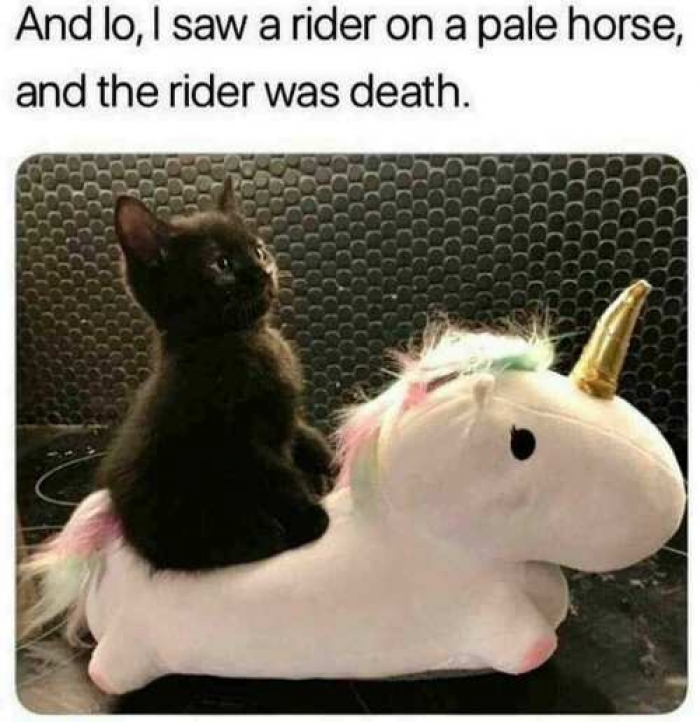
I think there’s one thing we can all agree about: it’s pretty awful that life doesn’t have a pause button when it comes to things like death and grief.
One of the things that Kristen always says (I call them Lamb’s Laws) is that real writers don’t wait for all the stars to align, perfect barometric pressure, and a good hair day in order to ‘feel the muse’ and write. That means that I’ve written parts of this blog on a plane from Boston to Indianapolis to grieve for a man who was like a father to me. I’ve written other parts in between condolence visits, remembrance services, and private moments of comforting.
Dr. Shahid Athar was a good man—a very good man, one of the few who truly lived the spirit of compassion, love, and charity that is central to all religions. He was an internationally-renowned doctor who would quietly slip away to volunteer his services in shelters. He was both deeply observant and an open-minded philosopher scholar who sought to bring faiths and communities together. He also had a wicked, sly sense of humor—I remember how he used to make my dad laugh until he cried, or the way I’d do a double-take when I realized he had just deadpanned a gentle burn on me. Oh, and his Fourth of July tandoori chicken barbecues for a hundred people were some of my best childhood memories.
I got the news on Saturday afternoon that he was slipping away. I reacted as I usually do in a crisis: I made a to-do list. Flights, hotel, car, packing, last-minute work stuff…it was only late that night when I was done that I allowed myself twenty minutes to drink half-a-glass of whiskey and cry. Then my timer went off, and I blew my nose, drank some water, and went to bed.
Yeah, I’ve got a timeshare by a river in Egypt.
Vulnerable Author, Visceral Prose
Let’s be clear. I know very well that I am putting off dealing with all of this. I give it about two weeks before I randomly burst into tears in the middle of CVS on a Tuesday. I get it. But, I also know that every time I grieve, I learn something different about grief itself. And like all good writers with vaguely sociopathic and dissociative tendencies, part of my brain is busy observing and cataloguing all this and figuring out how to use it to gut readers with my words.
The thing is, though, in order to do that, I will have to do the thing I hate most in the world (aside from picking up the dry-cleaning—don’t ask, I don’t understand it either). I will have to allow myself to feel and express emotion.
While there are certain limits to the ‘write-what-you-know’ philosophy like committing serial murder to get the ‘feel’ for it, imbuing characters with genuine reactions requires us to draw on a very personal well of feelings and life experiences.
If we want a truly visceral reaction from our readers, we have to be truly vulnerable. The honesty of deep emotion is what brings us all together, whether we like it or not. *side-eye at Sarah McLaughlin*

Echoes of the Present
One of the unexpected things I’ve experienced with this death is what I’m going to call ‘reverb.’
It’s the unexpected way a death can echo other deaths. Losing a man who was like a father to me is not exactly like losing my father. But, there are enough similarities that the great bell of memory rings in the space in my chest, its dark resonance vibrating deep in my bones.
It’s not déjà vu because in a sense, it has happened before. The call. The flight. The last-minute arrangements. The feeling of racing against time to get there for a goodbye. The sense that life turned another corner while you weren’t looking, and there’s no going back.

But, it’s not actually my father. It’s another daughter who has lost her anchor. It’s another son who suddenly discovers just how much business death involves. It’s another mother we are reminded is also a wife as she grieves for a marriage that at its heart began and ended with two people in love. It’s another home where we keep looking up expecting to see a father stroll into the room with a joke and smile for everyone.
When a character is confronted by death, it’s worth taking a moment to ask ourselves who is it that they have actually lost, beyond the labels of friend and family. Was that person a trusted confidant? An enemy who should have been a friend? Even a complete stranger’s death can go beyond the label when we realize that person had a full life of experiences that we would never know.
A person only truly dies once, but memory is thousand mirrors that reflect it back to us a thousand times a day.
Living Death
Death is experienced in its entirety by the living.
I know, but bear with me. Death spans the dying process and the moment of stoppage, but also the moments, minutes, days, and weeks after. It is the living who feel the aftermath.
There is a physicality to death—even a peaceful one—that shocks us and rocks reality down to its foundations. It splits time into before and after, and yet if we think about the paradox of infinitely divisible time, the moment of death exists for its own little eternity. It’s counted in beats per minute, oxygen levels, complex chemical reactions, and the half-life of cellular decay. It’s a creeping cold and a moment of absolute stillness that nothing but death can create.

I was at my father’s side when he drew his last breath. We had turned off the monitors. There was no point in taunting us with its cruelly absolute measurements. Instead, I watched the fluttering pulse in my father’s neck. It was so strange to see that little vein gently jumping beneath his skin. Even stranger still was how it faded and stopped. His expression changed, from the soft half-smile of sedation to a more solemn and severe mien as the muscles in his face went slack without the spark of a living brain and the impetus of a manifested will.
When characters behold death, what is it they actually see? Do they smell the crisp, bitter antiseptic cleaner of a hospital room? Do they hear an annoying sniffle of someone who just won’t blow their nose? Do they feel the chilly weight of a hand that will never hold them back?
Death is the end of a single story, but death lives on as a grim rule of punctuation for those whose survive.
There is no Cure for the Ugly Crying Hangover
One of the reasons I hate crying is because I always end up with gritty eyes, a snot-induced sinus headache, and an overall sense of being slightly puffy.
It’s not that I don’t cry. I can and do. *once more, throws shade at Sarah McLaughlin*

I know people who don’t really ugly cry. They won’t exactly win any beauty contests, but they don’t do the hiccupping-while-dripping-snot-that-ends-up-choking-you thing that makes people hesitate a fraction of a second before going in for the hug.
I hate those people.

Another thing I hate? When people recite to me the five stages of grieving. I want to take that linear progression and beat them with it. In reality, the five stages of grief are really most like a pinball machine.
We ricochet from anger to denial. Acceptance bounces back and forth between bargaining and depression. The first year alone after a death is a grief-stricken jackpot of shock, bad life choices, acting out, and fractured relationships.
I couldn’t wait to be done with all the ‘firsts’ – the first birthday, Fourth of July, Halloween (yeah, that holiday had me sobbing as I watched trick-or-treaters because he loved greeting them and giving out candy). I don’t remember much about the first Thanksgiving, Christmas, or New Year’s because frankly, I was either half-in-the-bag or fully in-the-bag. Not my proudest moments, but I have yet to be judged for grieving in a very imperfect but very human way.
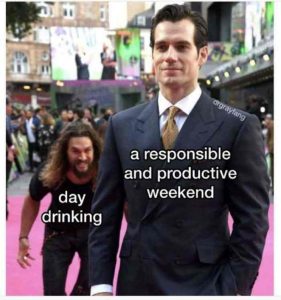
The same goes for characters. Sometimes, we struggle to have characters make the bad decisions that give them depth and create the conflict necessary for good stories. Death and grief give characters a way to be irrational and make bad decisions without making them unsympathetic.
Death is a Party
Go to any wake or at-home receiving time, and you will see the same tableau play out. The food might be different, the language might be strange, the gods foreign, but I will bet you two bits* (one of my father’s favorite phrases) that you will see the following cast of characters:
- The Organizer: Kind, busy, slightly harassed, slightly put-upon-but-secretly-enjoying-the-sympathy-of-being-the-hard-working-one…in other words, the Munchausen by Proxy griever;
- The Drama Queen: Usually centrally seated in living room, and also usually the prettiest crier in the family…willingly recites the account of how the defunct passed on over and over again for each visitor, basking in the spotlight of their sympathy;
- The Sh!tface Drunk: Can usually be found brooding out on the back porch because he/she hates people in general and doesn’t have the words to express the depth of their sorrow…also liable to engage the Drama Queen in World War III after the guests have left;
- The Angry One: A sober version of the Sh!tface Drunk…liable to engage the Drama Queen in World War III while the guests are still there, and also prone to snapping at the Organizer;
- The Inappropriately Cheerfully Spiritual One: Voted most likely to inadvertently trigger the Sh!tface Drunk and the Angry One into lashing out…also shunned by the Drama Queen because optimism and acceptance totally ruin her grief game.
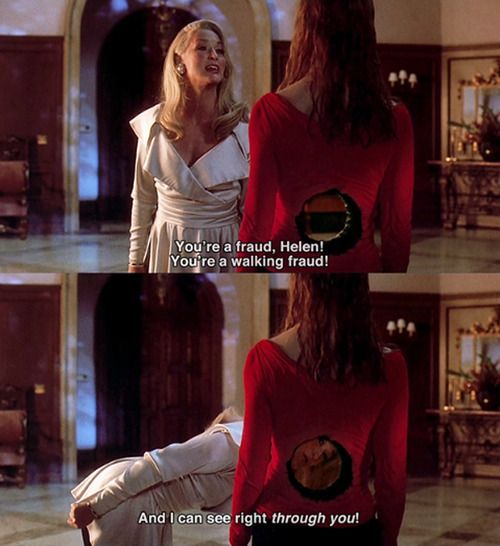
I know this is pure snark, but death often brings out personality traits that usually lie dormant. And, as much as death brings families and friends together, it is also an occasion littered with the landmines of conflict, misunderstandings, and miscommunication.
And, like I said earlier, if you’re like me and have those vaguely sociopathic and dissociative tendencies to always be observing and analyzing, death’s mix of irrevocability, emotion, money, and words is a volatile, combustible substance that practically guarantees good drama.
Like Fathers, Like Daughter
My father was unwavering in his faith that I would someday be a writer. Yes, he was encouraging and supportive when I had other jobs or got promotions, but he would always say at the end, “Just remember, Caity, you were meant to be a writer.” (And just so people don’t get any ideas, only my father, my Uncle Shahid, and his family are allowed to call me Caity.)
I made a deathbed promise to my father to become that writer. I’d like to think he heard me in his sedated state. More importantly, I know he would be happy that I accomplished this goal for my own sake and my own future.
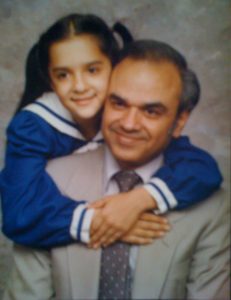
Father and Daughter
Uncle Shahid was also an author. He published numerous books about Islam, both for the Muslim community and for the general public in his relentlessly optimistic drive to bring people of all faiths together. He believed people could be better. He believed in the power of words and communication to build bridges over the chasms of fear, ignorance and prejudice. He fearlessly tackled subjects like balancing the advances of modern medicine with the ethical concerns of contemporary Islam, healing the wounds of September 11th, and how to communicate healthy attitudes about sexuality to Muslim youth.
He wrote books of poetry and reflections on prayer. He was a newspaper guest columnist. And, let’s not forget, he wrote scientific and medical research papers for his work as an endocrinologist.
He did all of that while speaking English as a fourth language after Urdu, Arabic, and Hindi. He could also tell jokes in all four languages. As I sit in his study writing this, I am looking at the wall-to-wall bookshelves filled to overflowing with books on everything from the history of medicine, to classic literature, to Native American art. I will miss his passion for the written word.
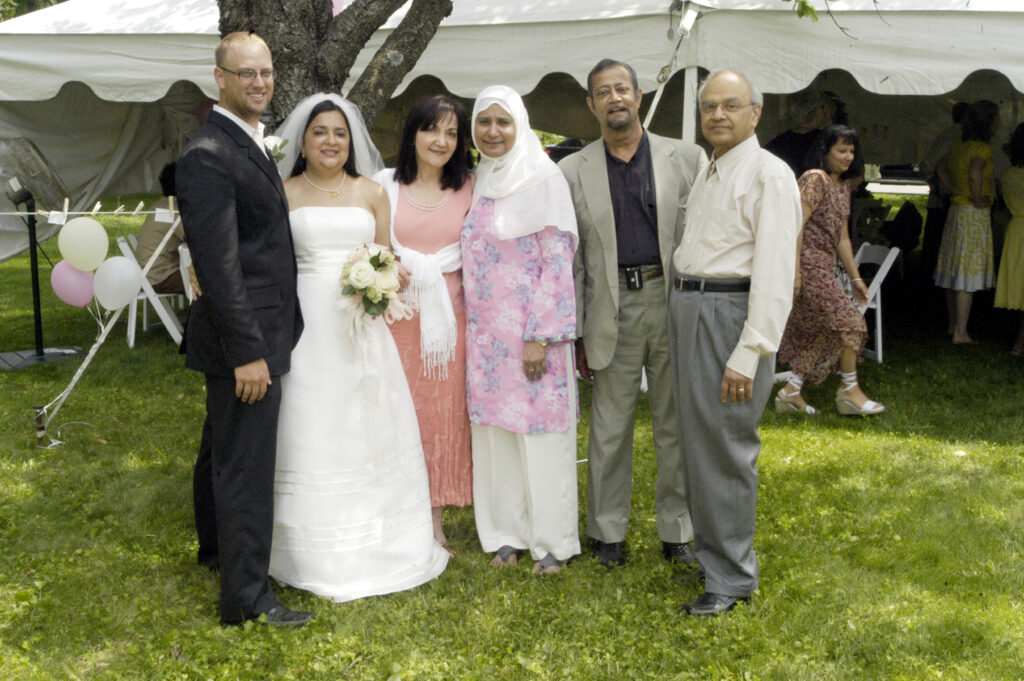
Nine languages, four religions, four immigrants, two citizens born, three life-threatening chronic illnesses, countless heated discussions about cooking…and a lifetime of memories with my family.
Shahid Athar was the father who stood by me as my dad drew his final breaths, and who—from memory—began to recite one of the poems both he and my dad loved:
UNDER the wide and starry sky
Dig the grave and let me lie:
Glad did I live and gladly die,
And I laid me down with a will.This be the verse you ‘grave for me:
Here he lies where he long’d to be;
Home is the sailor, home from the sea,
And the hunter home from the hill.– Robert Louis Stevenson
I’d like to think that they are laughing together somewhere, arguing about some outrageously academic, esoteric, political, religious, literary, technological topic…or maybe they are just comparing notes on the daughter who is writing this and missing them.
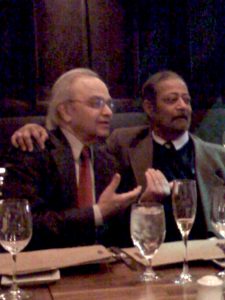
Left-Right: my father Dr. K.C. Khemka, my other father Dr. Shahid Athar. Friends and brothers once more together.
Whether it’s grief, love, anger, commitment, or loss, what emotion that scares you the most to put down paper? I’d love to hear your thoughts.
Upcoming Classes for August & September
 Brand Boss: When Your Name Alone Can Sell
Brand Boss: When Your Name Alone Can Sell
Instructor: Kristen Lamb
Price: General Admission $55.00 USD/ GOLD Level $175
Where: W.A.N.A. Digital Classroom
When: Thursday, September 13th, 2018. 7:00-9:00 p.m. EST
REGISTER HERE

Building Planet X: Out-of-This-World-Building for Speculative Fiction
Instructor: Cait Reynolds
Price: $55.00 USD
Where: W.A.N.A. Digital Classroom
When: Saturday, September 8th, 2018. 10:00 a.m.—12:00 p.m. EST
REGISTER HERE

Populating Planet X: Creating Realistic, Relatable Characters in Speculative Fiction
Instructors: Cait Reynolds & Kristen Lamb
Price: $55.00 USD
Where: W.A.N.A. Digital Classroom
When: Saturday, September 8th, 2018. 1:00—3:00 p.m. EST
REGISTER HERE
 Beyond Planet X: Mastering Speculative Fiction
Beyond Planet X: Mastering Speculative Fiction
Instructor: Kristen Lamb
Price: $55.00 USD
Where: W.A.N.A. Digital Classroom
When: Saturday, September 8th, 2018. 4:00—6:00 p.m. EST
REGISTER HERE

The XXX Files: The Planet X Speculative Fiction 3-Class Bundle
Instructors: Cait Reynolds & Kristen Lamb
Price: $110.00 USD (It’s LITERALLY one class FREE!)
Where: W.A.N.A. Digital Classroom
When: Saturday, September 8th, 2018. 10:00 a.m.—6:00 p.m. EST.
REGISTER HERE
Recordings of all three classes is also included with purchase.

Go Fish: Finding the Right Beta Readers
Instructor: Cait Reynolds
Price: $55.00 USD
Where: W.A.N.A. Digital Classroom
When: Friday, August 24, 2018. 7:00-9:00 p.m.
REGISTER HERE
More Than Gore: How to Write Horror
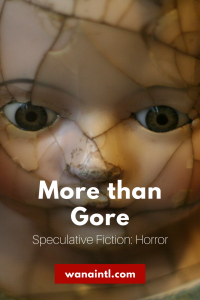 Instructor: Kristen Lamb
Instructor: Kristen Lamb
Price: $40.00 USD
Where: W.A.N.A. Digital Classroom
When: THURSDAY, August 30th, 2018. 7:00-9:00 p.m. EST
REGISTER HERE

Keywordpalooza: Tune in, mellow out, and learn to love keywords for Amazon
Instructor: Cait Reynolds
Price: $55.00 USD
Where: W.A.N.A. Digital Classroom
When: Friday, September 7, 2018. 7:00—9:00 p.m. EST


 Brand Boss: When Your Name Alone Can Sell
Brand Boss: When Your Name Alone Can Sell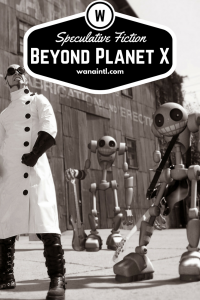 Beyond Planet X: Mastering Speculative Fiction
Beyond Planet X: Mastering Speculative Fiction






11 comments
1 ping
Skip to comment form
A very moving post.
Author
Thank you, Vivienne!
Yes, very moving. You made me weep for men I never met, because I know what it’s like to lose a father. Thank you for including the photos.
Author
Thank you! If only I could have found pictures of his tandoori chicken, that would have had EVERYONE weeping. And hugs to you on the loss of your father. It’s the world’s saddest club.
Interestingly, I think it’s love that’s scariest to put on paper. I’ve been burned so much.
Author
I totally agree. I think it’s probably because love and death have the same element of irrevocability. We can cease to love someone, but we are forever indelibly marked by the experience.
Both eloquent and evocative!
I think the best advice on grieving I’ve ever had was from “8 Simple Rules”, weirdly enough: it’s ok to be happy when you’re happy and it’s ok to be sad when you’re sad.
Grief is hard enough without judging ourselves on how we measure up to some perceived ‘ideal’ way of working through it.
It’s a bit like the flu: it’s unpleasant, it’s messy, and there’s no point telling it how it’s supposed to go, because it ain’t listening. You’ve just got to take care of yourself and wait it out.
Wow! Wow!I paused when I reached the sentence about a thousand mirrors and said to myself, “This is a boss piece of writing. You can’t really write; you have much to learn about writing.”
This article is simply excellent, so much so I read it twice!
You said it all so poignantly I can only say thank you.
As for the pinball metaphor, I too felt that way and thought I was losing my mind. Again, thanks.
Wonderful article. I felt that in my soul. I know what it is to lose a father and a grandfather who were both larger than life. The pinball metaphor is perfect. The firsts don’t really matter anyway. I hurt as much today as I did then. I just deal with it a little better.
This is a lovely essay. I’m sorry for your loss, Cait. Hugs.
[…] those developing characters, Cait Reynolds shows how characters come alive in death, and Gabriela Pereira examines writing by design (Part 4): contrast, or light versus […]